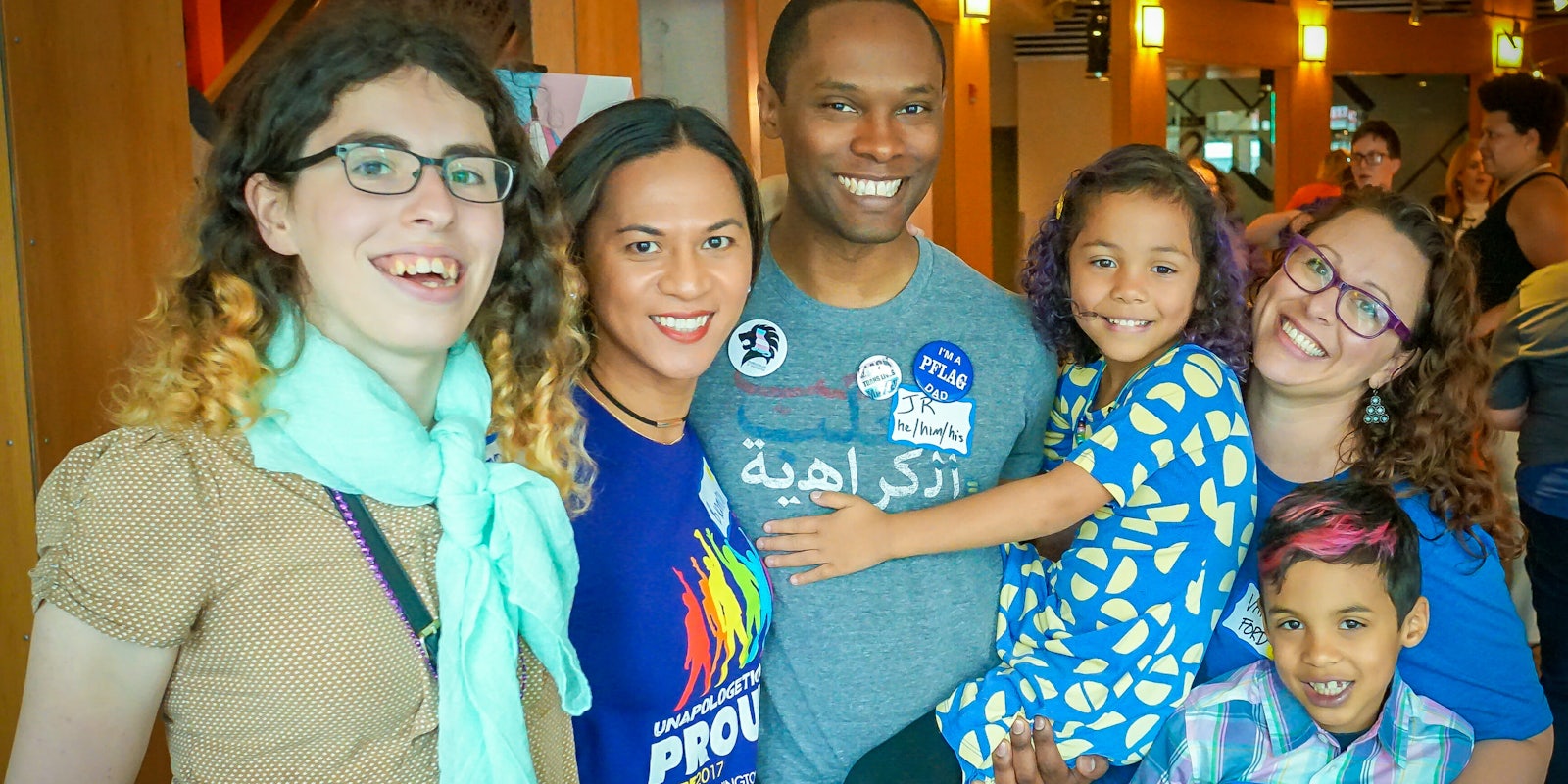Coming out is one of the hardest things that a transgender child can do. It’s also one of the toughest storms a family can weather. Parents and siblings must mentally and emotionally shift their conception (and often perceptions) of a trans child—who they are as a person, their name, their appearance—when the child begins transitioning. Even for the most accepting parents, this is no small feat.
Parents need to not only keep their trans child’s well-being in mind but also their own (and their other children’s) while their child transitions. Here are some steps families should take to make sure everyone is navigating a child’s transitioning in the best and healthiest way possible.
You’re going to cry
At least once, maybe multiple times, your child’s transitioning is going to hit hard. Even if you’re 100 percent on board and you’re ready to help your child grow up into the person they’ve always needed to be, you’re also saying goodbye to a part of them that you (and the rest of your family) love. This means you’re going to experience some form of grief. And it may take some time to process those feelings and move on.

This process is entirely normal. When your child transitions, there’s a loss involved. Whether it’s a couple of days or a couple of months, acceptance is the last stage of grief, not the very first. You’re going to have to feel some uncomfortable emotions for a time, and you’re going to have to sit with them, experience them, and work through them.
But it’s OK to feel sad, scared, lonely, or all three emotions at once. It’s even OK to feel those alongside the happiness that your child is finally becoming who they always knew they were (perhaps even the guilt that you “missed something” that would have eased them into transitioning sooner). It’s a complicated process everyone has to go through.
But you need to make your child feel accepted
Remember the first time you were dumped? Even though you loved your partner, they said it was time to go, and you had to honor their wishes. Because you loved and respected them, you let them step away. And on your own time, you worked out all the emotions and feelings that remained, until you were ready to move on.
Dealing with transitioning grief is similar, in that a child’s emotional and mental needs are extremely important during the coming out stage. While it might be hard to accept your child’s transitioning, it’s important to honor their pronouns and gender identity from the very start. Chances are your transgender child will feel extremely vulnerable during this stage of their life, and your actions now can help pave a healthy future between you and your children.

So if your child asks to be referred to by she/her pronouns and identifies as a woman, then refer to her with she/her pronouns and call her a woman. The sooner you make your child feel loved, supported, and affirmed, the easier it will be for both of you to grow together as your child transitions.
Go to a trans support group
Support groups are extremely useful tools. They give families a place to talk out their problems and vent. But they’re also learning opportunities for parents, ones that allow family members to meet people experiencing different stages of a child’s transitioning—from denial to acceptance.
Families that go to trans support groups have the opportunity to learn more about their child’s experiences and form a baseline from other families about transitioning and coming out. Support groups can also give families recommendations for further counseling services, such as family therapy or a gender therapist for a trans child. And group therapy is a great opportunity to speak up and share thoughts, feelings, or concerns that come up during transitioning, like navigating school environments or coming out to extended family.
Seek out help if you need it
Therapy is important for everyone, not just a trans child going through transitioning. Therapists give parents the opportunity to share their feelings, vent about problems, or deconstruct troubling or anxiety-inducing feelings in a judgment-free zone. Therapy also lets parents work through their reservations about their child’s transitioning, including any deep-seated fears about trans people.

Therapy can be done in a variety of ways. Parents can go in for one-on-one sessions with a therapist, or they can go together as a couple. The entire family can go to therapy, or children who need help dealing with their sibling’s transitioning can seek a children’s counseling.
Be ready to help out
Your child is probably going to have a lot of questions about gender expression during their transitioning. Things like “How do I put on makeup?” “How do I tie a tie?” or “How should I dress for a job interview?” When your transitioning child is ready to ask these questions, this is a great time to step in and help them.
For one, helping them express themselves is an important way to show love. It’s sweet and nurturing when a parent offers to take their child to the mall and gently coach them through clothes shopping.
Being there for your child also maintains and strengthens the parental bond. It lets your child know that they can still approach you about life skills, no matter how embarrassing it may feel. For instance, if you’re a father and your son is a transgender man who has questions about how suits should fit or giving firm handshakes during interviews, it’d be great if he knew he can rely on you for advice.
Spending this time together is both a loving outing and an opportunity to build new memories that are affirming for your child.
Listen if you’re making mistakes
Your first few weeks in might be a bit bumpy. Maybe you accidentally misgendered your child, or you used the wrong term in reference to their transitioning. It’s OK to make mistakes. After all, mistakes are human nature. But if you’re doing something wrong, you need to own up to it—especially if you’re hurting your child.

For example, let’s say your transgender daughter told you that posting pre-transition photos of her on Facebook is making her uncomfortable. Instead of becoming defensive, listen to her and put yourself in her shoes. Understand why it might be insensitive or make her feel upset. Honor her feelings, even if you don’t initially understand them.
On the other hand, don’t be overly apologetic. Your child is likely to understand that mistakes do happen and to be forgiving. Profusely apologizing just makes the situation embarrassing at best. Or at worst, it can lead a child to feel guilty for standing up for themselves, and therefore less likely to bring up issues in the future. Instead, remember to listen to your child, be there for them, and be ready to learn.
Realize this isn’t going to be forever
Your child is going through some growing pains, and you will too. And for a time, things are going to hurt. They might even hurt for awhile. But it’s not going to last forever. Eventually, the cocktail of depression and confusion surrounding a child’s transitioning will be lifted, and things will begin to make sense again.
Parents need to process their child’s transitioning to get to the point of acceptance. But transitioning isn’t the end, it’s only the beginning. It’s a journey that family members can take together, supporting one another, as their child continues taking steps forward with their gender transitioning.
So look forward to the end of the beginning. Set your sights on acceptance. And in the meantime, try your best. It’s the most loving thing you can do.



